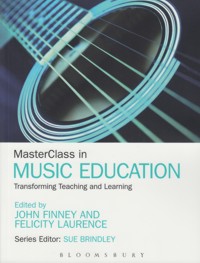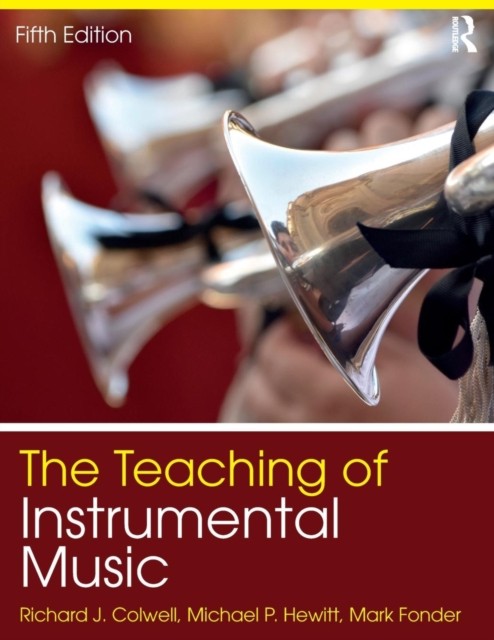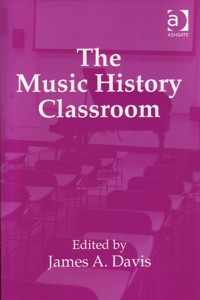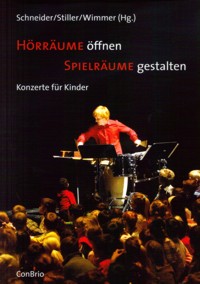
MasterClass in Music Education: Transforming Teaching and Learning
Finney, John
;Laurence, Felicity
Bloomsbury Publishing. 2013Ficha técnica
- EAN: 9781441130860
- ISBN: 978-1-4411-3086-0
- Editorial: Bloomsbury Publishing
- Fecha de edición: 2013
- Encuadernación: Rústica
- Dimensiones: 19x25
- Idioma: Inglés
- Nº páginas: 222
No disponible temporalmente
Disponibilidad sujeta a la información del editorPVP. 68,15€
Añadir a la Lista de deseos
MasterClass in Music Education provides vivid, topical, reflective and above all ?real? accounts from existing teachers researching in the field, together with theoretical insights and a guided view of the relevant existing literature.
Students embarking upon research will gain a many-faceted understanding of the possibilities for using action research and other research methods to explore the interesting and challenging issues confronting music education. At the same time, they will be able to develop an understanding of how to carry out research from the real life case study accounts written by their peers. John Finney and Felicity Laurence provide overarching support, drawing on their own experiences as supervisors of MA Music Education students to frame the debates and reflections which arise.
CONTENIDOS:
List of Figures
List of Tables
Series EditorŽs Foreword (Sue Brindley)
Acknowledgements
Notes on Contributors
Preface
Prologue: Rethinking Assessment in Music,
(Di Brady)
- A serious problem
- What are we assessing in music?
- Project outline
- A musical revival
- Musical knowledge and understanding (MKU) and the poetic
- Rethinking assessment
- A change in the children
- A new environment
Part I: Setting the Scene: Reflective Music Teaching
1. Music Teachers as Researchers (John Finney)
- Researcher as critical educator
- From PGCE to Masters
- Teacher as insider
- Setting the boundaries of research
- Novice insight
- Summary
2. Doing Research in Music Education (Felicity Laurence)
- Working out where you stand: reserch paradigms and qualitative enquiry
- Ethics and power
- Story
- Pupil voice
- Processes of doing resarch
- Case study
- Conclusion
Part II: Investigating Music Educational Practice
Introduction (Felicity Laurence)
3. Young Children's Inventive Singing: A Critical Reading (Isla Hughes)
- Summary of the article
- Analysis
- Conclusion
- Epilogue
4. Singing for Learning: Questions of Methodology and Method (Hannah Craine)
- Why canŽt we just say our times tables?
- Reviewing the literature
- The research questions
- Research design
- Overview of the teaching sequence
- Conclusion
- Epilogue
5. Children's Enjoyment of Singing in a Primary School: Processes and Problems in Survey Methodology (Rachael Baskaran)
- Timeline
- Epistemology
- Survey Methodology
- Questionnarie and interview methods
- Conclusion
6. Being Researched, Becoming a Researcher: Ethical Dilemmas (Julia Partington)
- Confidence and partnership
- Being researched
- Doing research
- Conclusion
7. Transforming an 'Unmusical' Primary Teacher into a Confident Musician: A Case of Personal Narrative Enquiry, (Zoe Bremner)
- The background
- Musical experience growing up- (not very much)
- My first experiences of teaching music
- A second chance: the partnership project
- Epilogue: Singing in my llife now
8. GCSE Music - Why so Few? Looking Again at Others' Research (Zoë-Laura Bridel)
- Questionnaire design
- Types of questioning
- Interviews: answers "behind" the questionnaire data
- Replicating earlier research
Part III: Teacher and Pupils Exploring Together
Introduction (John Finney)
9. Understanding Children's Musical Engagement in the Primary School Through Collaborative Research (Elizabeth Kelly)
- "...ask the children themselves!"
- Discovering the childrenŽs views
- Children as music-education researchers
- Teacher as music-education researcher
- Data analysis and representation
- Findings
- Conclusions and reflections
10. Developing Positive Attitudes Towards Singing in Year 7 Through Dialogue and Negotiation (Eleanor Man)
- The school and its musical environment
- Action research, strategies and methods
- Three big ideas
- Reflections
- The future and the callenge it brings
11. Pupil Consultation as Catalyst for Cross-Curricular Learning in Secondary Schools (Oliver Bond)
- Context
- Cross-curricularity
- Interdisciplinary or multidisciplinary?
- A sociological perspective
- Interim summary
- Research questions
Part IV: Understanding Young People's Musical Lives In and Out of School
Introduction (John Finney)
12. The Problems of School Music: Self-Efficacy and Musical Identities in Years 7, 8 and 9, (Hannah Bibby)
- Part 1 - Self-efficacy and theories of motivation
- Part 2 - Identity theories
- Part 3 - The "problems" of secondary school music
- Conclusions
13. An After School Rock School Investigated: Why Are They Here? (Joanne Cheetham)
- A school with a Rock School
- The story begins
- Learning how to be a different kind of teacher
- Conclusions
14. Tom Becoming a Composer: A Narrative Account of One Pupil's Creative Journey (Laura Scott)
- Tackling the challenge: first steps
- Methodology
- Findings
- Tying together the findings
- Reflections
15. Playstation Power: Removing Performance Barriers to Musical Composition (Alex Baxter)
- Technology and the music classroom
- The Playstation interface and the effects on pupil motivation to perform and compose...
- Enhancing the process of composing
- Conclusions, and a move forward
16. Performing Samba, Finding 'Flow': Fostering Engagement in the Secondary Music Classroom (Katy Ambrose)
- My study
- Flow
- Finding flow in my music clasroom
- Methodology
- Findings and discussion
- Conclusion
Part V: Reflections
Introduction (Felicity Laurence)
17. Making Sense of the Music of the Stranger (Kathryn Jourdan)
- Recent thinking about music education
- The music-making of pupils in Shetland: "ItŽs just what we do here"
- An ethical encouter: Levinas and the "Other"
- Reflections on a way forward
Epilogue: Changing Music Education (Ruth Wright)
A Guided Reading List
Index





